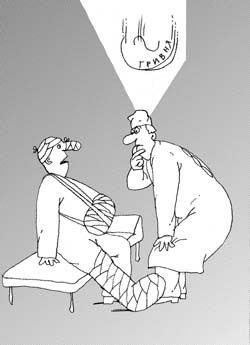Who will pay for the poor?
Or, what kind of medical insurance system do we need?
The next draft law on the question of financing healthcare and medical insurance is being studied in Ukraine’s parliament. Draft law no. 2192 has provoked a number of heated discussions about the advisability of its enactment in Ukraine. Last week health management professionals discussed what social medical insurance can and should be like.
Medical insurance should provide treatment to all those who need it, as stated in the Constitution of Ukraine. But at the present stage it is impossible to create truly cost-free medical care. Among its crucial features these professionals name the lack of correlation between compulsory medical insurance and the risk of becoming ill: the underprivileged have the most health problems, and they are the ones who have to pay a lot of money for health care. Ideally, the number of services that are offered to an insured individual should be universal. It should not depend on the size of the insurance premium, but be determined by the patient’s urgent needs.
The most serious shortcomings of contemporary Ukrainian medicine, including medical insurance, are a lack of money and inefficient use. According to Oleh Petrenko, adviser to the Minister of Health, in the last few years Ukraine has been spending more than 6 percent of its GDP on medical care. “This is more than in European countries and much more than we can afford,” Petrenko said. “At the same time people are spending significant amounts of money privately - between 39 and 52 percent of all health expenditures in Ukraine.”
Even with all these high costs the state still lacks funds to cover medical care costs, and as a result the quality of medical care and access of socially vulnerable groups are decreasing, while declared free medical care is becoming paid. This has led to dissatisfaction with health services and the curtailment of medical care for those who cannot pay for treatment.
In Petrenko’s opinion, even more serious results may be the shadow financing of medicine, corruption in this sphere, and the public’s distrust of the changes being proposed by the government.
The fact that a goodly part of health care expenditures has been placed on the population is underlined by Valeria Lekhan, the main non-staff professional in Ukraine’s Ministry of Health, who works in the sphere of health care management and organization. According to Lekhan, the population and the state are paying approximately equal amounts for medical services and developing this sphere. Funds are disbursed in a decentralized way, often not through state structures but specific doctors who, for example, control the financial resources of a certain hospital. Today’s medical insurance system is a holdover from the Soviet era of a planned economy, whereas medical institutions are already living in market conditions.
The creation of a universal social medical insurance system for all population groups requires, first of all, choosing a model of medical care that would enable Ukraine to reform the medical sphere with the least amount of money. “There are competitive and non-competitive models of social medical insurance organization,” Lekhan says. “They entail the creation of one or several quasi-state funds that may or may not compete with each other. For countries that are just starting to switch to such insurance systems, the most convenient thing is a single national social medical insurance fund. Such funds have already been created in some countries of the former USSR, and after several years they have already achieved positive results.” Such a fund could bolster positive changes by uniting all the financial channels directed to medical institutions.
All these arguments favor social insurance. The draft law that has been submitted to Ukrainian parliamentarians insists on another system - public insurance. This system entails a regressive character of financing, i.e., those who earn more will spend a higher percentage of their income on medical care. Such an approach means the existence of different service programs that depend on the amount of insurance. Social insurance is defined by experts as that which creates solidarity and fairness: the rich pay for the poor, and both get a similar service package.
As a result of the conflict between the civic-social and strictly social approach to insurance in medicine, which has raged for the entire period of our independence, no law has been adopted, and therefore a significant number of Ukrainians have no access to normal medical care.
However, it looks as though there are more supporters of private commercial insurance in Ukraine, including among members of the Verkhovna Rada. Perhaps the idea of “Robin Hoods” in the health sphere is unacceptable to many Ukrainians, who don’t want to spend their own money to help others.
Nevertheless, equal access to medical services, which would not only declare but also guarantee a well thought-out medical insurance mechanism, is a factor that allows the nation to survive by providing social protection to the poorest segments of the population.
How much will Ukrainians pay when the parliamentarians resolve the question of medical insurance? “As long as there is no concrete project, it is premature to talk about amounts,” says Lekhan. This health management professional is also convinced that it will no longer be mandatory to pay for a doctor’s visit or bring “presents.” If the money channels flow in a centralized fashion, the state will be able to pay proper salaries to doctors.






